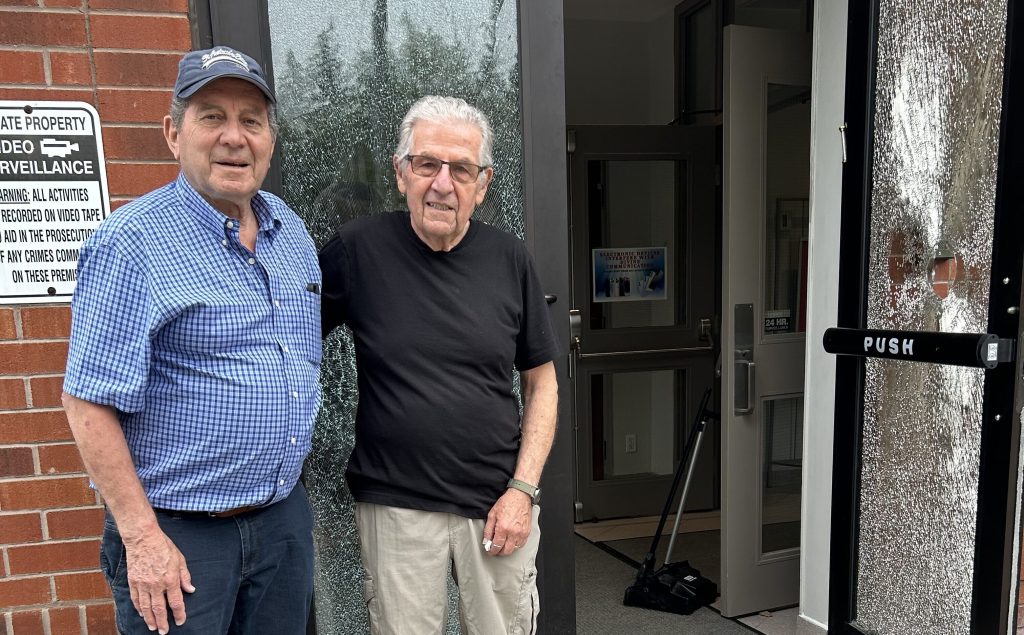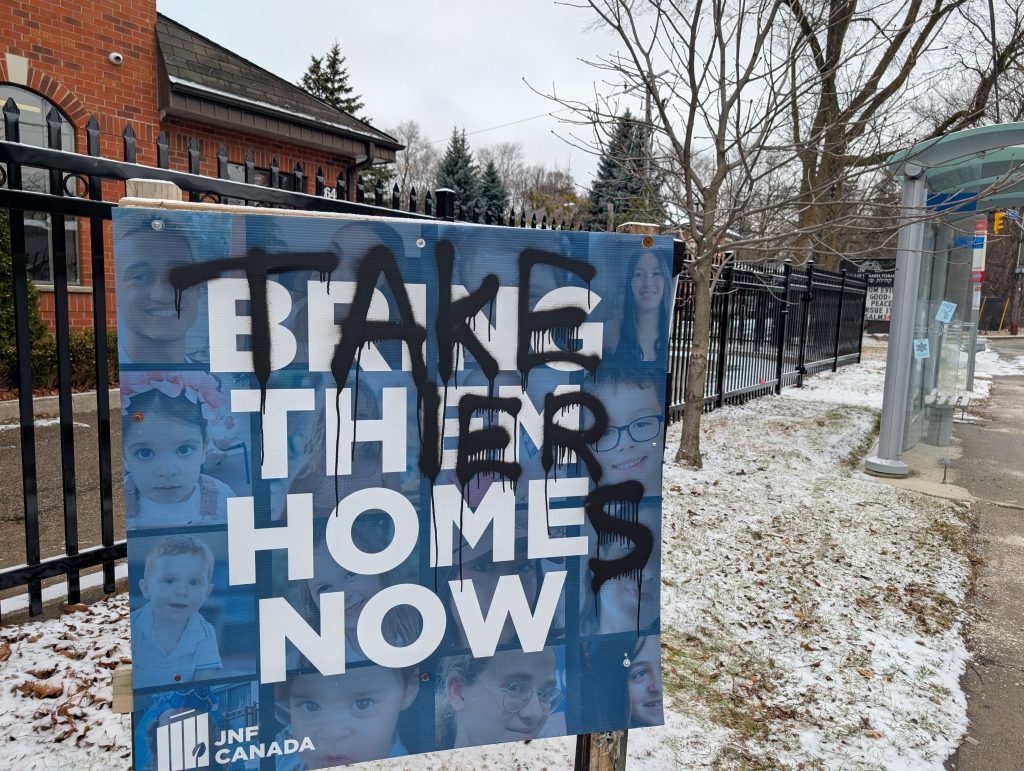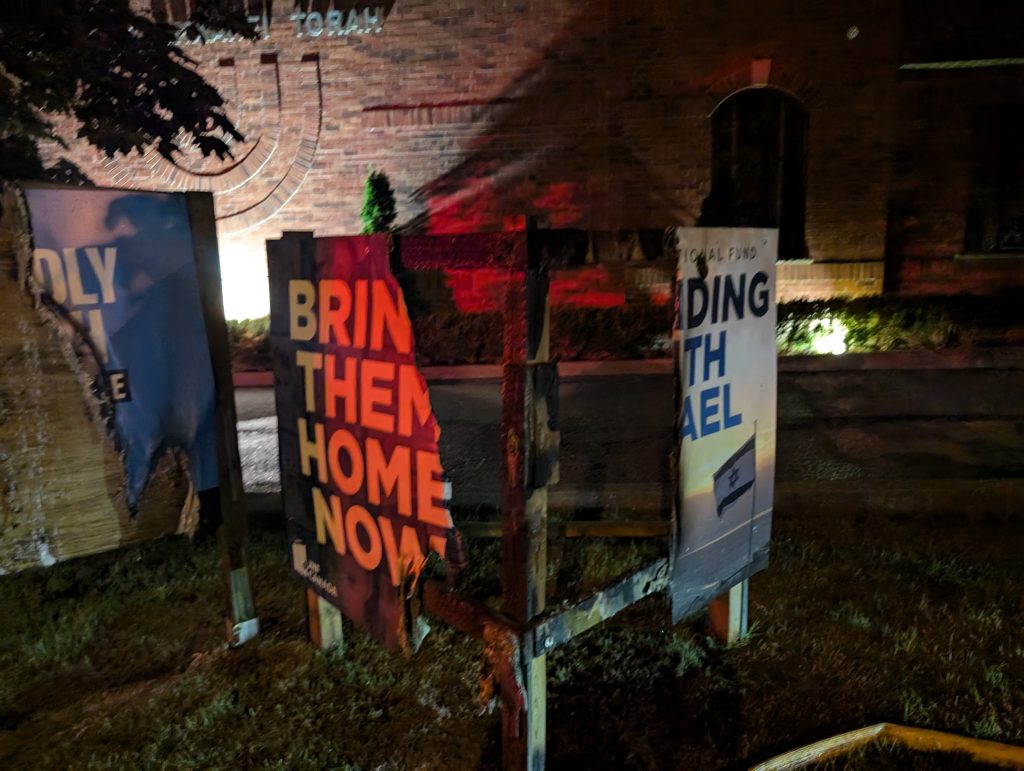Michael Gilmore, who runs the synagogue that may hold the ignominious title of being Canada’s most vandalized, has become accustomed to 3 a.m. phone calls.
After hearing from the security company, he’s braced for coordinating a daytime visit from Toronto Police Services—a recurring experience in the aftermath of vandalism and other attacks targeting the building.
The executive director of Kehillat Shaarei Torah (KST), a 45-year-old modern Orthodox congregation with about 200 member families located in the Bayview Village area of North York—which has been led by Rabbi Joe Kanofsky since 2009—has learned to respond nimbly to overnight attacks: the shul was vandalized, attacked, and/or sustained property damage, at least eight times between April and December.
One person was arrested in early January in connection with a July 31 incident at the synagogue, when two sturdy lawn signs expressing the synagogue’s support for Israel were set on fire. It’s the first arrest in the series of incidents determined to be hate-motivated. Police confirmed Jan. 14 an arrest was made in connection with the case, but have yet to release further details about the charges or the identity of the person arrested, pending an ongoing investigation.
Gilmore, who spoke with police on Jan. 13, said he’s pleased that at least one suspect has been found.
“I have always had full confidence in their ability to do it… it takes longer in reality than we’d like, but that’s just the system that we live in…. and hopefully the rest of our vandalism [incidents]… the person, the people that [did those] does get arrested as well,” he told The CJN on Jan. 13.
Since last April, the synagogue at the corner of Bayview Avenue and Fifeshire Road has had its windows and glass doors smashed by hammers and attacked with exploding mini-projectiles Gilmore says were designed to crack the glass on impact—along with several incidents of lawn signs for hostages set ablaze and defaced with spray-painted messages.
The first time the synagogue was attacked, it hit Gilmore hard.
“We all have that deep-seated fear as a Jewish people that one day something’s going to happen, to our synagogue,” school, home or childcare centre, he reflects.
“Waking up to those vandalism [incidents] [represents] that fear being actualized.”
KST’s executive director has learned to adapt and anticipate, figuring out next steps after an incident: “Who needs to talk to the police?”
“Now in my head I’ve unfortunately worked that into my routine,” he said, coming to anticipate that “we’re probably going to get vandalized again.”
“How do we navigate everyday shul life while always getting vandalized? How do I make sure I organize my day well enough … [so that] I could deal with the police… with getting things fixed [if] they need to be,” mused Gilmore.
The first incident, in April, involved a suspect smashing five windows with a hammer and was followed by a dead raccoon being left in the shul parking lot, which was not deemed to be a suspected hate-motivated occurrence. Another hammer attack followed May 17.
Next came a June 30 incident involving projectiles someone threw at the building that Gilmore says were designed to damage the windows.

“It wasn’t rocks, because they made these little explosions when it hit our window,” he said. “Luckily we already had the polycarbonate [window coverings] on, it prevented projectiles from getting through the windows, but they still shattered the glass behind it, and it created… a small, not explosion, but it kind of broke apart, exploded a bit when it hit the polycarbonate covering. [Those] weren’t rocks for sure… [the person] brought those with [them].”
Gilmore characterizes the people vandalizing the synagogue as cowards.
“Never in my life have I thought, ‘oh, it’s 3 in the morning. I’m going to go vandalize a place of worship, try and scare some people.’ I mean, I’m asleep… a person who has a life that’s filled with commitments, they can’t do [that]. The person whose life is filled with hate and just wants to destroy, they find the time.”
Gilmore has developed a working rapport with police and has maintained contact with the Toronto Police Services (TPS) Hate Crimes Unit during its investigations.
The eight separate incidents don’t follow any predictable sequence of events. However, Gilmore has noticed distinguishing details about the individual suspects when reviewing security videos.
“The person who smashed the windows was left-handed when they use the hammer. The person who threw the projectiles through our windows was right-handed. They came on a motorcycle. The person that [set the sign on fire, on July 31] was right-handed. They came in and they lit the sign on fire and then went south on a motorcycle again.”

The suspect in the two December incidents, whose images police released earlier in January, “came without a mask” and had “different hats” according to Gilmore—and they seemed to be a different suspect than other vandalism incidents.
As to why his synagogue has been singled out, he believes it’s KST’s location.
The synagogue is not on the heavily-travelled Bathurst Street corridor, home to many of the city’s Jewish institutions. The building is easily visible along a road with no close residential neighbours in sight, and is just a few blocks from Highway 401, where vandals can make a quick escape.
“I think it’s… some [part] opportunities, some [part] where we are located, and … in the area, that they know the synagogue and it’s the easiest place for them to vandalize.”
Gilmore has overseen a range of security upgrades and additional expenses since spring 2024, including adding additional security video cameras, and in some cases replacing them with better cameras. A new access control system enables him to see “who enters the building, when they enter, when they leave” and a security fence was recently installed around the entire premises.
Windows that were broken have been replaced, and polycarbonate security coverings were layered atop those windows in addition to a security film to prevent anyone from actually entering the synagogue if they managed to get through the polycarbonate covering. Security film was also added to glass door replacements.
Night time security guards were also hired depending on the news from Israel, for instance when Hezbollah leader Hassan Nasrallah was killed, and during Jewish holidays.
Gilmore says the security company has been responsive to KST’s needs. However, the synagogue can’t afford to have security guards on-site permanently.

The federal programs to assist communities experiencing hate crime attacks will, eventually, reimburse half the cost of upgrades, says Gilmore, but he finds the process of applying for the Public Safety Canada grants unduly slow and onerous.
Worse for this particular congregation—whose clever wordplay slogans on its roadside sign have earned global attention online—is that Gilmore finds they are caught in a bureaucratic catch-22. The shul’s security grant application was made under the previous Security Infrastructure Program (SIP) and reimburses up to 50 percent of total costs.
That application and reimbursement process was already underway when the new version of the program, Canada Community Security Program (CCSP), which reimburses up to 70 percent, was rolled out—but work begun or undertaken under the previous program’s funding can’t be funded by the new program.
Gilmore can’t apply for the increased reimbursement for any work that’s already been done, and would lose the current 50 percent reimbursement grant if he pulled out of SIP to instead apply under CCSP.
‘This whole thing has been a headache basically for every other synagogue director I’ve spoken to,” he said. He explains that after KST was vandalized, it qualified for the federal program’s fast-tracked funding stream, called Severe Hate-Motivated Incident Support.
“When I initially submitted the application, we’d only been vandalized once, when the process had started… by the time it was all finished, we’ve been vandalized four times. It took a few months to get everything approved. We had to go through and calculate all the costs that we would be applying for.”
He says it’s a fault in the system that’s set up to appear to be doing more than it really is, and in the process creates onerous tasks for security grant applicants who are in the middle of responding to unsettling incidents.
“I’m not sure how they came up with [these programs]… it feels like no members of the groups this is supposed to help have had input,” said Gilmore.
He says he understands the government’s attempt to support communities who’ve been targeted, “however, if they’d spoken to member of Jewish community… synagogues, schools … they’d see how effective the program actually is.
“It feels like the government talking to the people [they’re supposed to help], rather than a partnership,” which Gilmore finds “unfortunate, but common.”
Fortunately, a “KS Strong” fund raising drive in 2024 helped the shul pay for the upgrades, which he says came out to $151,286, with a federal grant reimbursing half, or $75,643. He notes that donations came not only from members but also from the wider community around the synagogue.
In addition, Jewish Security Network (JSN), the new independent agency that absorbed the security operation previously housed under the UJA Federation of Greater Toronto, has been supporting KST with security consulting, assessments, advice on upgrades and procedures, and providing some of the funding for the synagogue’s security costs.
According to Gilmore, the security recommendations from the JSN team, then with UJA, matched those of TPS nearly identically.
JSN’s director, Jevon Greenblatt, confirmed that JSN has committed to paying a portion of KST’s security upgrade cost, but declined to say how much.
The area’s new Toronto city councillor, Rachel Chernos-Lin, cited the vandalized synagogue at a city hall meeting in December, during discussion on a bylaw proposal to prevent demonstrations from encroaching on community spaces as well as grants to protect vulnerable buildings from car attacks. After about 90 minutes of debate, a vote secured the funding and a request to staff to develop the bylaw proposal.
“At City Hall, we often speak about the beauty of Toronto being our diversity. But increasingly Jewish families in Toronto are being targeted with hate and real antisemitism, and we as a council… cannot let this continue,” Chernos-Lin said at the council meeting Dec. 18.
“No community in Toronto should have to live in fear. No community in Toronto should be held responsible for the actions of governments in other parts of the world because of their religious affiliation. For many in my community, it doesn’t feel like meaningful action has been taken to combat antisemitism, not just at the city level but by all levels of government, and so I believe it is up to us as a council to say ‘enough is enough’ and ‘what can we do?’”
In an interview with The CJN, Chernos-Lin, formerly a school trustee for the ward, said she’s heard criticisms that there’s been a lack of government taking action.
Jewish Torontonians, including in her ward, she says, want to know “‘why are we a year in and not seeing anything being done?”
“The longer we go, and allow hate to manifest, the worse it’s going to get and the harder it’s going to be to stop it down the road,” she said.
“If we really care about everybody in our city, we have to be standing up for Jews.”
"Eight attacks. That’s how many times Kehillat Shaarei Torah, the Toronto synagogue where I grew up, celebrated my bat mitzvah, and served as youth director, has been targeted. Once would have been too many. Eight times is a national disgrace…
— Aviva Klompas (@AvivaKlompas) December 27, 2024
The prime minister, premier,… pic.twitter.com/iHQbXfi6Be
Ruth Urbach, a longtime member of KST—whose services roamed from area homes to makeshift facilities for most of the 1980s, as it gradually settled into the site of a bungalow that was demolished and then replaced by the current building—says the close-knit congregation has been brought even closer of late, but there’s much more to community life than these incidents.
“I would hope people know when they think of the synagogue not to think that we’re all only dwelling on this, and frightened. You can come to the shul and it might not even come up. It doesn’t inform every interaction that we have,” she told The CJN.
“It’s something that’s going on. We wish it hadn’t happened and we really hope that there will be [more] arrests. No synagogue should have to deal with anything like this,” said Urbach, who is also a current board member—though she added “the shul’s dealing with it very well.”
The congregation has always included a significant portion of members from the South African Jewish community, reflecting the majority of the families who ware part of its founding in November 1980. Celebrations and events for its 45th anniversary are in the works for later in the year; several members who signed the original article of incorporation are still around.
When the celebration is being planned, the “hateful incidents” of 2024 don’t come to mind, according to Urbach.
Michael Gilmore says the synagogue refuses to back down in the face of vandalism, which may be why it has been targeted so frequently.
“They [vandals] could do whatever they want to do, and it’s not going to stop us from being proud Jews… from being proud members… I think that is the overall feeling… of strength and unity, and carry on with life,” he said.
After the first vandalism the community united in a message of defiance to vandals and attackers.
“You’re going to try and break us… we’re not going to be broken,” he said, remembering a response from the synagogue’s rabbi, assembled in block letters on the permanent sign outside the building.
“Windows shatter easily. Communities don’t,” said Gilmore, quoting Rabbi Kanofsky’s now most-circulated outdoor sign message. “That’s what has really been our mantra.”
CORRECTION (3/18/25): The previous version reported that an arrest had been made on Jan. 13 in connection with the July 31 arson incident at KST. In fact, The CJN learned on Jan. 13 from Michael Gilmore that an arrest had been made, the same day he spoke with officers from the TPS Hate Crime Unit who had informed him of an arrest. Police confirmed to The CJN via email Jan. 14 that an arrest had been made in connection with the case, but did not release further details, pending an ongoing investigation. The story has been updated to reflect the date Gilmore and The CJN learned from police that an arrest had been made.
Author

Jonathan Rothman is a reporter for The CJN based in Toronto, covering municipal politics, the arts, and police, security and court stories impacting the Jewish community locally and around Canada. He has worked in online newsrooms at the CBC and Yahoo Canada, and on creative digital teams at the CBC, and The Walrus, where he produced a seven-hour live webcast event. Jonathan has written for Spacing, NOW Toronto (the former weekly), Exclaim!, and The Globe and Mail, and has reported on arts & culture and produced audio stories for CBC Radio.
View all posts








